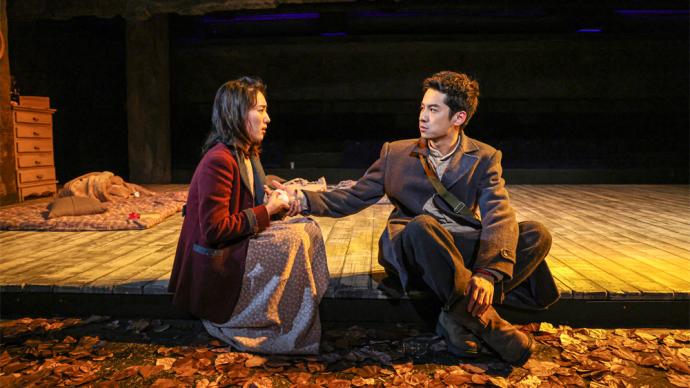
From June 24th, Beijing Renyi Theatre's repertoire "My Poor Marat" will appear on the stage of the Experimental Theatre. This delicate and euphemistic yet profound and intense work not only presents the audience with the youth and dreams stirring on the stage, but also conducts an in-depth discussion of the complex issues of life. After its premiere last year, the play has returned for the second time this year as a performance to commemorate the 70th anniversary of the founding of the academy. This is also after the end of the performance of "Miss Julie" on March 21, after a lapse of three months, Beijing Renyi Experimental Theater opened its doors again to welcome guests. 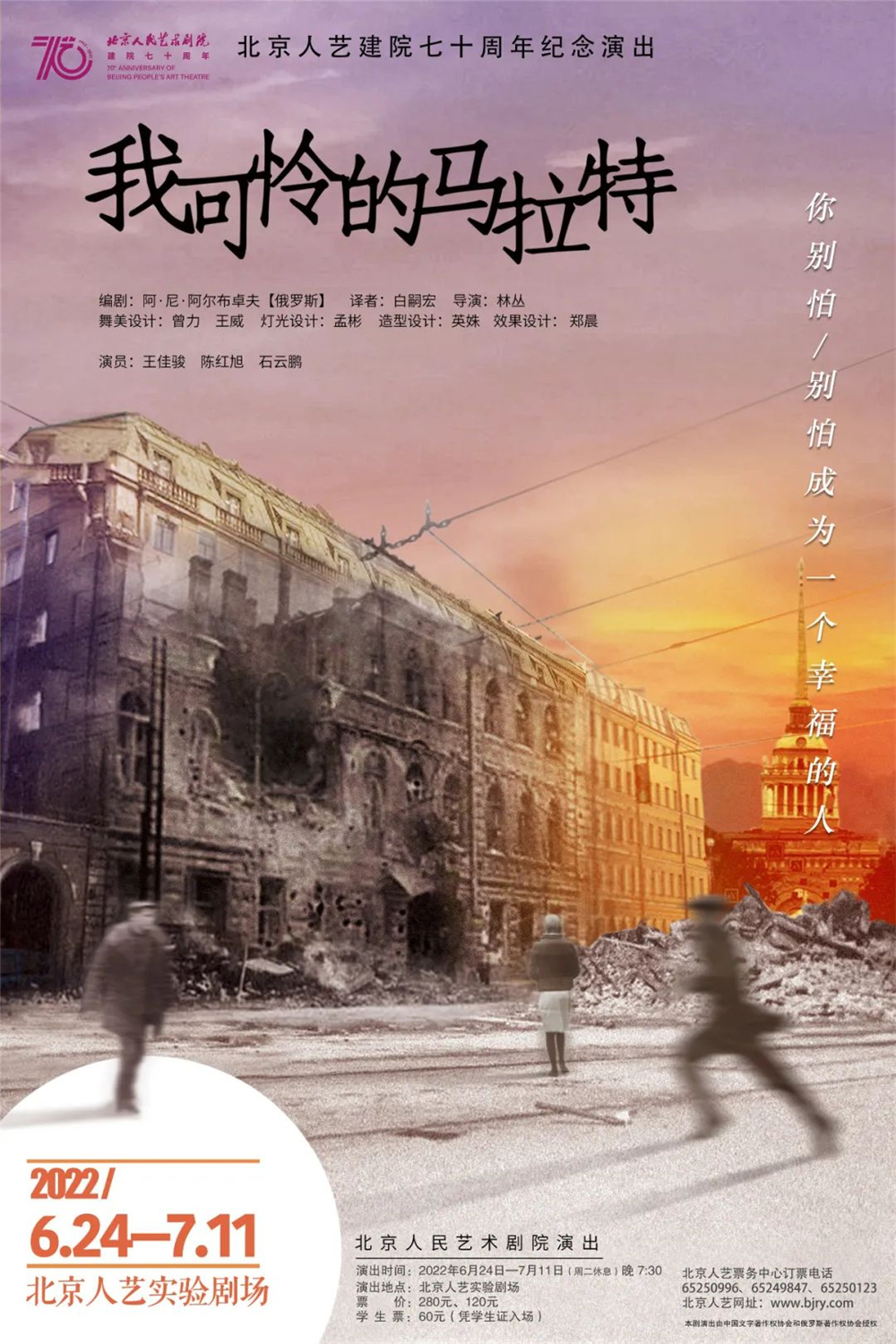
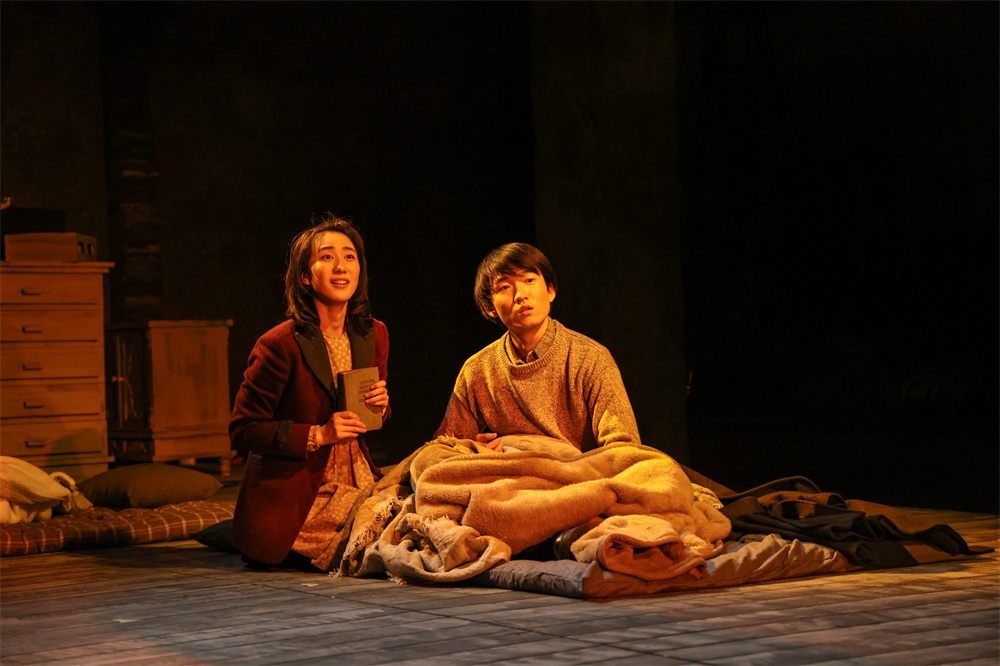
Director Lin Cong said: "Just as the protagonist in this play is growing, I hope we can use our works and the audience to accompany each other's growth together." She also showed a special audience book specially customized for this round of performances in the circle of friends, which was praised by the audience. Made into the style of a letterhead, she also wrote in the letter, "Theatrical is a bridge. It connects the stage and the soul, the past and the future, and the reality and the ideal. We are all poor Marat, let us live bravely, don't Afraid to be a happy person."
"Don't be afraid to be a happy person" is a very important proposition in psychological research - even though everyone has an instinct for self-realization. The paradox is that, whether it is in the workplace or in love and marriage, many people are unworthy of it and often dare not really pursue happiness. The famous play "My Poor Marat" by the famous Soviet playwright and representative of the "family psychodrama genre", Albuzhov (1908-1986), is exactly what you can see.
"My poor Marat, you always fantasize about the impossible, but you're afraid of being a happy person." It was Rika's accusation against the seemingly cynical, but cowardly, man in the play. Sentence: They clearly loved each other for a long time, but because of friendship and sympathy, they passed each other time and time again. Especially when Leon came back from the Eastern Front with a broken arm, and selfishly wanted to use Rika's love as the last sustenance of his life - even if he knew that there was more sympathy during this time, he would take it for himself. Lat chose to exile himself from the living room that belonged to him... In the vast territory of the Soviet Union, Marat finally became a bridge engineer, but was unable to build a heart bridge and returned to his lover.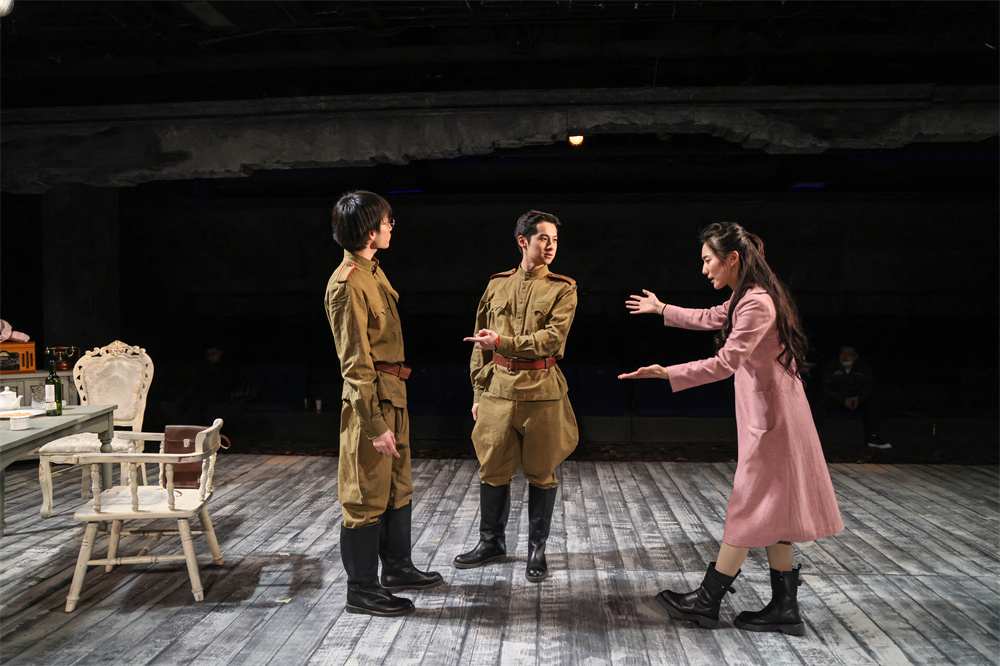
Second polishing, "strengthen the character's personality"
As a work showing a complex life experience, this play undoubtedly poses a huge challenge for the actors - the complex life encounters of the characters create a multi-faceted personality for each person, and they need to be both restrained and expanded when performing, expressing layers of meaning clear. For Wang Jiajun, Chen Hongxu and Shi Yunpeng, the three young actors of Beijing Arts and Crafts, this is a challenge and an opportunity for stage growth.
After the first round of performances last year, everyone gained more experience with the characters, so director Lin Cong also put forward new requirements for the actors on the basis of being accurate and in line with the tone of the characters, "This round we will, based on the feedback from the audience, Adjust some rhythms. At the same time, it emphasizes the personality of the characters themselves, which can be released and closed, and show more inner worlds of the characters." In order to better improve the young people, the crew also arranged for He Bing to guide the monologue for the actors. "This is also the tradition of people's art. It is reported that Feng Yuanzheng, vice president of Beijing People's Art, has opened a performance workshop for the play. Well-known actor He Bing even convened three young actors before this round of performances to teach Monologue skills in the play.
The three leading actors in the film, Wang Jiajun who plays Marat, Chen Hongxu who plays Rika, and Shi Yunpeng who plays Leon, are all actors born in the 1990s. The eldest Wang Jiajun has just passed his thirties. In this Soviet drama, he also presented a section of the horse-drawn carriage dance unique to the Russian nation, showing his impressive stage skills. Watching their performances, you can see both the natural flow of life and the poetic depression, the ups and downs brought about by war, the separation and reunion of love choices in peaceful times, and the fire of ideals that has never been extinguished in my heart. , all of which are perfectly executed.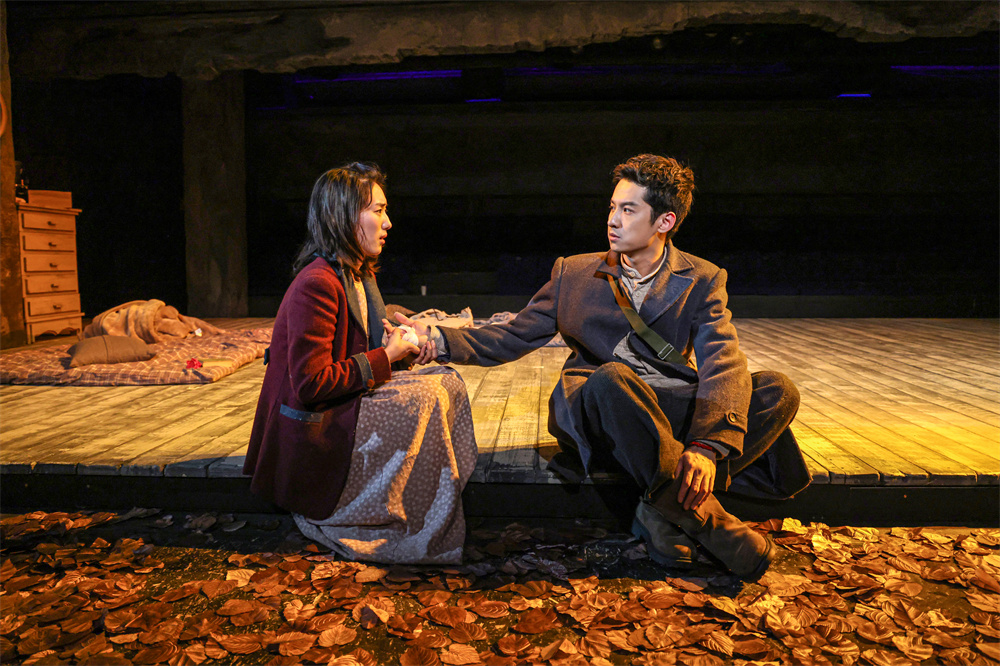
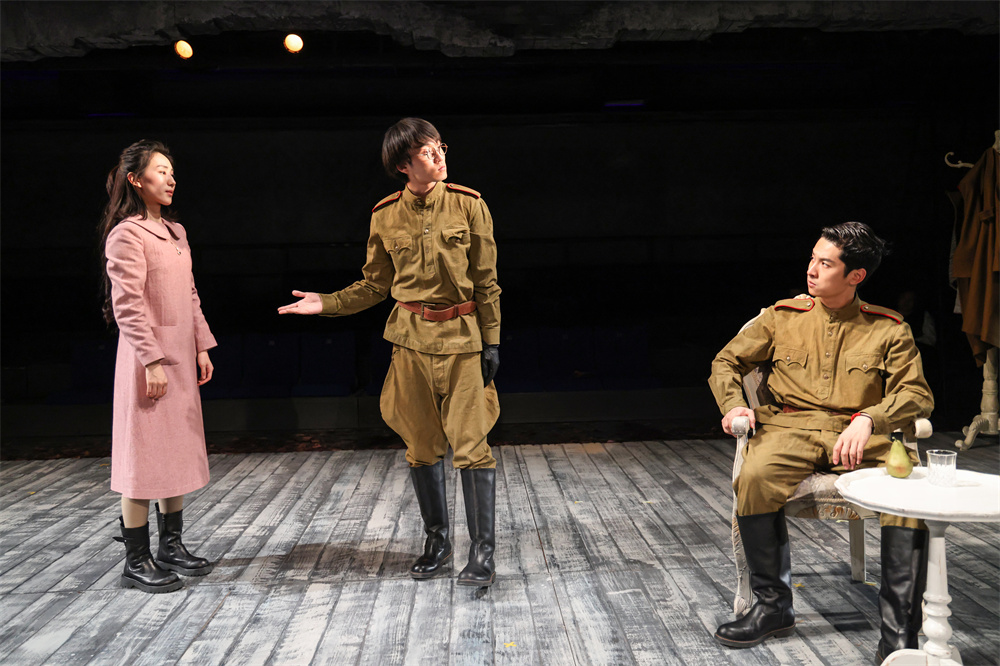
Looking back on the past, along with the tide of reform and opening up, Beijing Renyi has embarked on a new drama attempt. On July 15, 1982, Beijing Renyi's original drama "Absolute Signal" began rehearsals and officially performed on November 1, creating a precedent for Chinese small theater dramas and being known as the "pioneering work" of Chinese small theater dramas. "Absolute Signal" absorbs the dramatic techniques of Western modernism in the form of expression, breaks through the time structure of traditional drama, broadens the space for dramatic performance, and explores new concepts of drama and stage.
According to The Paper reporters, in order to adapt to the development of the drama situation, cultivate talents, and open up a new performance position, Beijing Renyi has successively built Beijing Renyi Small Theater and Experimental Theater: The cafeteria was converted into a small theater, which was completed and put into use in November 1995. The opening play was "Love" (directed by Ren Ming) by American playwright Sam Sheppard, which was rehearsed by the theater. In 2008, due to the aging of the equipment, the small theater was discontinued. In October 2018, the overall planning of the expansion was completed, and the small theater was officially demolished. In 2021, with the completion and use of the Beijing International Drama Center, the Beijing Renyi "Small Theater" will be restored again in the center.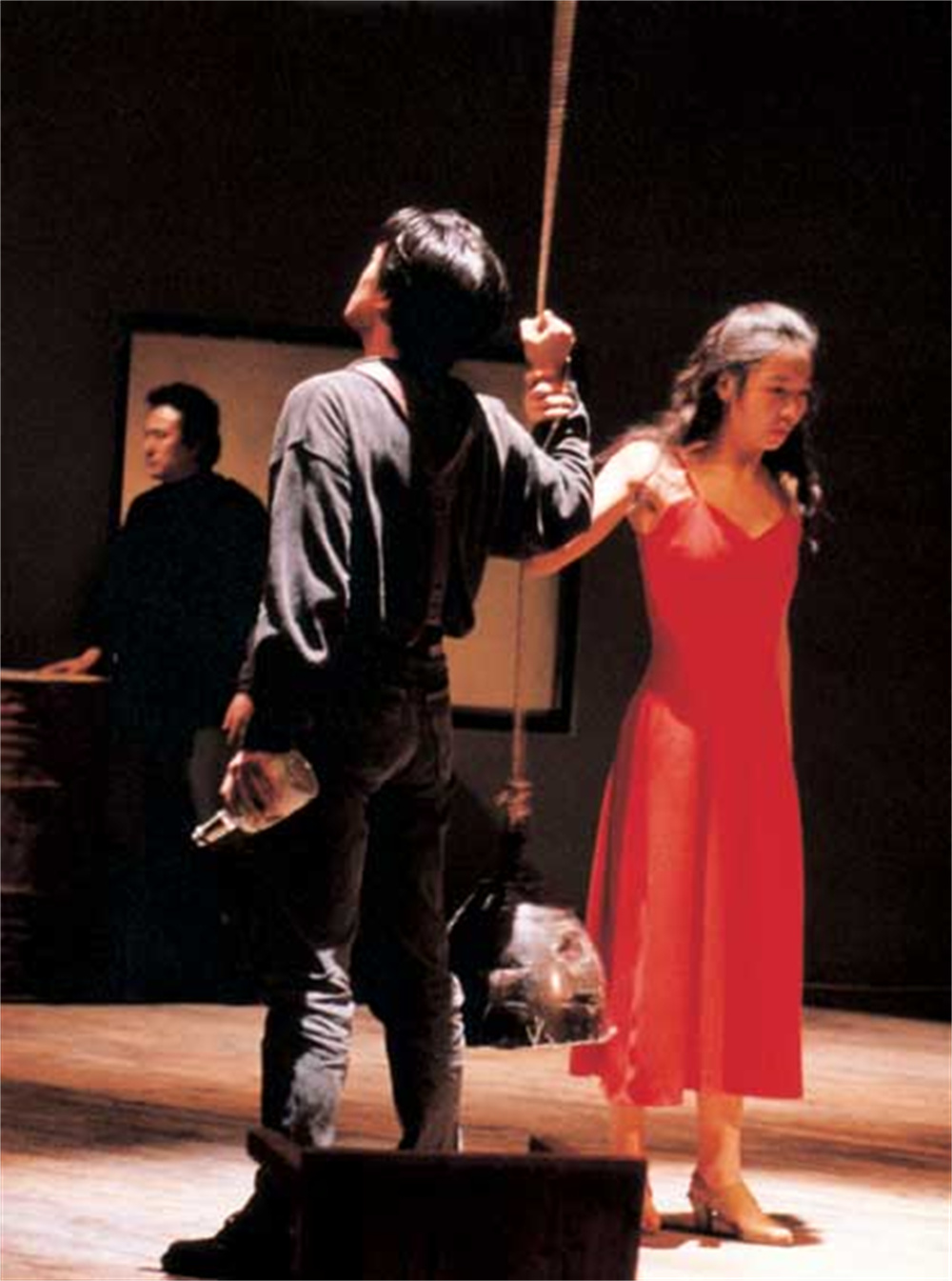
Ren Ming, director and director of Beijing Humanities and Arts, who passed away recently, said with emotion, "The small theater drama is a 'dream factory'. It provides a stage for directors to show their innovative and exploratory spirit. Many experimental theaters are held in such venues. If you want to really understand Chinese stage play, you have to watch the small theater.”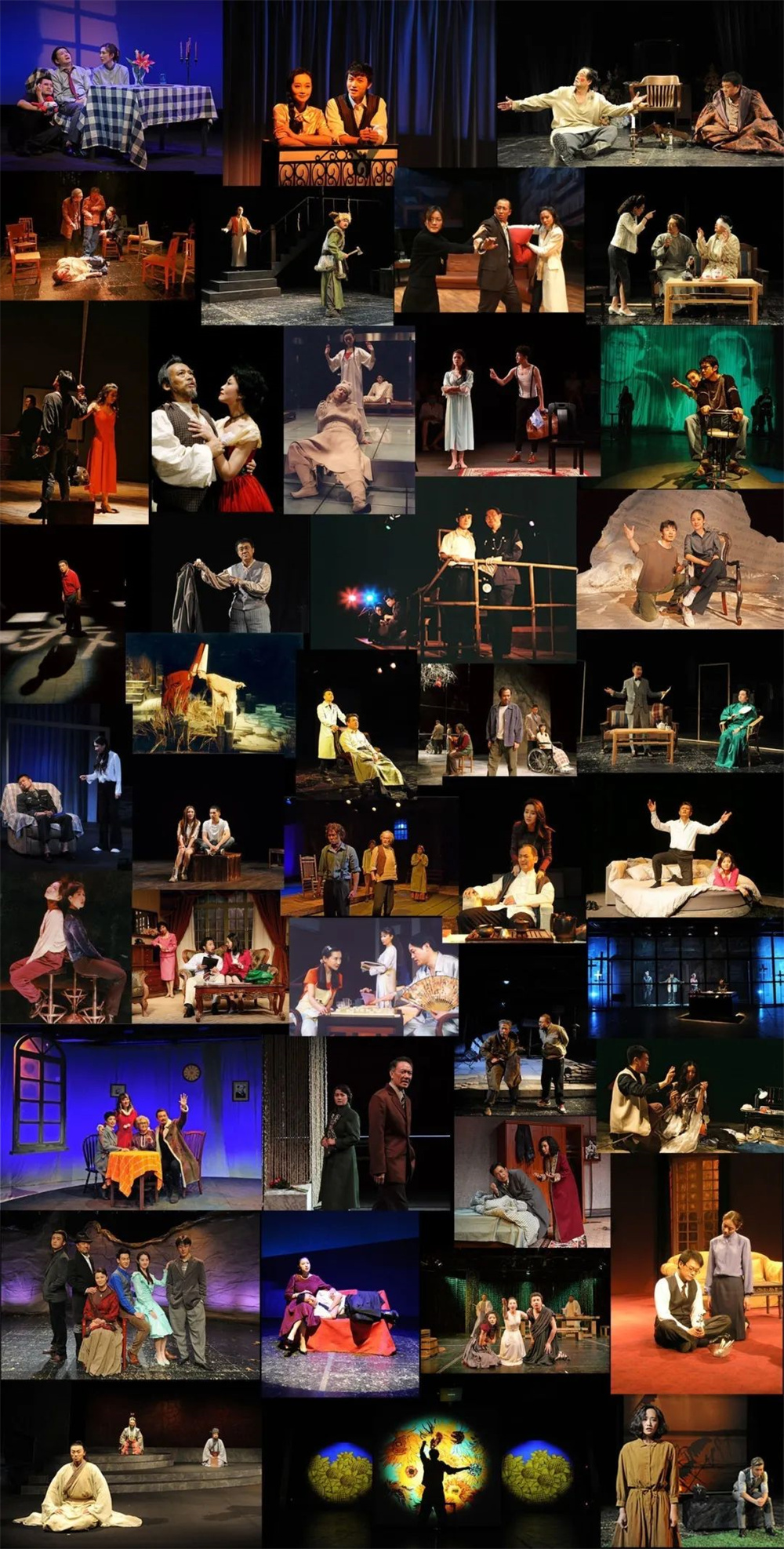
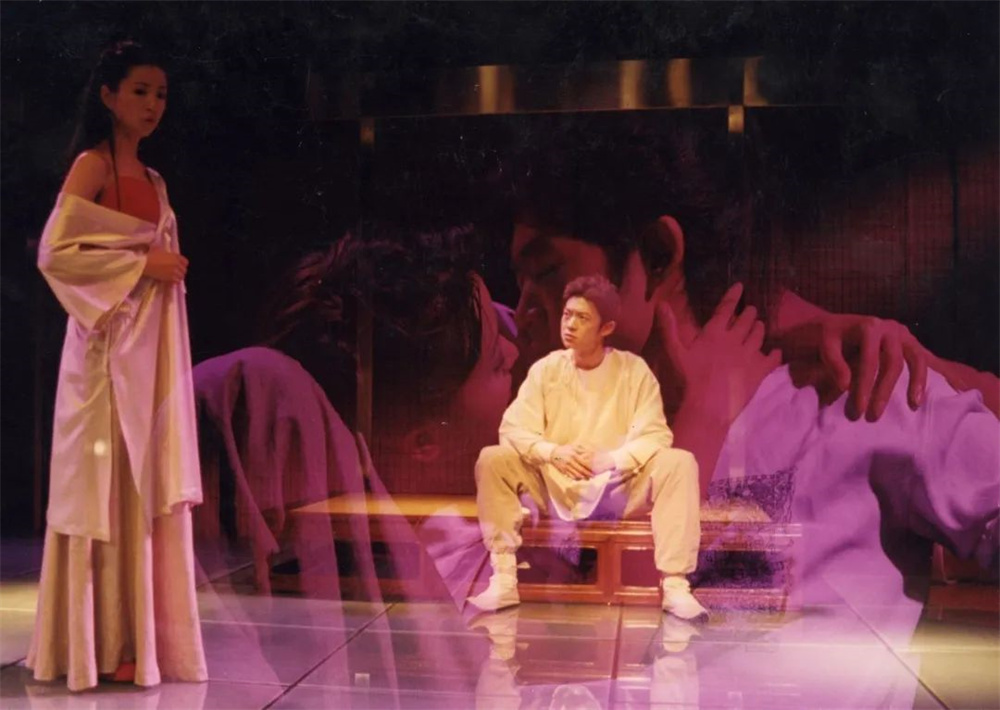
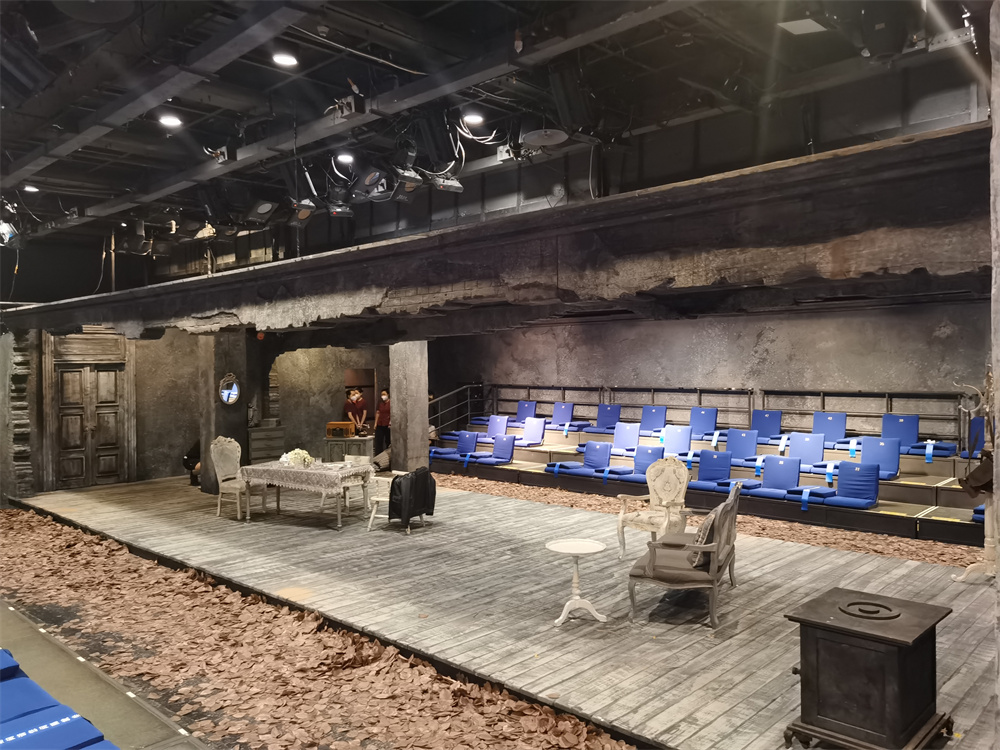

My Poor Marat poster
The year 2022 marks the 70th anniversary of the founding of the Beijing People's Art Theatre, and it is also the 40th anniversary of the Chinese small theater drama. Beginning with the pioneering drama "Absolute Signal" staged at the Beijing Renyi Experimental Theater in 1982, it is a contemporary small theater drama in China. The acting career flourished. Lin Cong, the famous artist of Beijing Renyi and the daughter of Lin Zhaohua, the director of "Absolute Signal", is the director of Renyi's version of "My Poor Marat". This is also the first time she has directed a drama on the Renyi stage. After the premiere on June 24, Lin Cong expressed his feelings in his personal circle of friends: "It is a pleasure to meet in the theater."
The stills of "My Poor Marat", the stills in this article were all shot by Li Chunguang.
"Don't be afraid, be a happy person"Director Lin Cong said: "Just as the protagonist in this play is growing, I hope we can use our works and the audience to accompany each other's growth together." She also showed a special audience book specially customized for this round of performances in the circle of friends, which was praised by the audience. Made into the style of a letterhead, she also wrote in the letter, "Theatrical is a bridge. It connects the stage and the soul, the past and the future, and the reality and the ideal. We are all poor Marat, let us live bravely, don't Afraid to be a happy person."
"Don't be afraid to be a happy person" is a very important proposition in psychological research - even though everyone has an instinct for self-realization. The paradox is that, whether it is in the workplace or in love and marriage, many people are unworthy of it and often dare not really pursue happiness. The famous play "My Poor Marat" by the famous Soviet playwright and representative of the "family psychodrama genre", Albuzhov (1908-1986), is exactly what you can see.
"My poor Marat, you always fantasize about the impossible, but you're afraid of being a happy person." It was Rika's accusation against the seemingly cynical, but cowardly, man in the play. Sentence: They clearly loved each other for a long time, but because of friendship and sympathy, they passed each other time and time again. Especially when Leon came back from the Eastern Front with a broken arm, and selfishly wanted to use Rika's love as the last sustenance of his life - even if he knew that there was more sympathy during this time, he would take it for himself. Lat chose to exile himself from the living room that belonged to him... In the vast territory of the Soviet Union, Marat finally became a bridge engineer, but was unable to build a heart bridge and returned to his lover.

"My Poor Marat" stills
In 2019, Beijing Renyi staged Albuzoff's "Old-Fashioned Comedy" for the first time, which was well received. Albuzhov enjoys a high reputation in the Soviet Union and even the international theater, and has the reputation of "Modern Chekhov". "My Poor Marat", as always, reflects his caring style of people, focusing on people's life, destiny, and emotions as the starting point. With delicate and euphemistic and passionate brushstrokes, it tells the story of three young people who met in war. The stories of encounter, separation and reunion are also about how each person should face life and choices, and how to find and understand their true self. Director Lin Cong explained that this actually represents an attitude towards oneself and life, "What is our happiness, what will we lose for this happiness, and will we not pursue it because we are afraid of losing it?"Second polishing, "strengthen the character's personality"
As a work showing a complex life experience, this play undoubtedly poses a huge challenge for the actors - the complex life encounters of the characters create a multi-faceted personality for each person, and they need to be both restrained and expanded when performing, expressing layers of meaning clear. For Wang Jiajun, Chen Hongxu and Shi Yunpeng, the three young actors of Beijing Arts and Crafts, this is a challenge and an opportunity for stage growth.
After the first round of performances last year, everyone gained more experience with the characters, so director Lin Cong also put forward new requirements for the actors on the basis of being accurate and in line with the tone of the characters, "This round we will, based on the feedback from the audience, Adjust some rhythms. At the same time, it emphasizes the personality of the characters themselves, which can be released and closed, and show more inner worlds of the characters." In order to better improve the young people, the crew also arranged for He Bing to guide the monologue for the actors. "This is also the tradition of people's art. It is reported that Feng Yuanzheng, vice president of Beijing People's Art, has opened a performance workshop for the play. Well-known actor He Bing even convened three young actors before this round of performances to teach Monologue skills in the play.
The three leading actors in the film, Wang Jiajun who plays Marat, Chen Hongxu who plays Rika, and Shi Yunpeng who plays Leon, are all actors born in the 1990s. The eldest Wang Jiajun has just passed his thirties. In this Soviet drama, he also presented a section of the horse-drawn carriage dance unique to the Russian nation, showing his impressive stage skills. Watching their performances, you can see both the natural flow of life and the poetic depression, the ups and downs brought about by war, the separation and reunion of love choices in peaceful times, and the fire of ideals that has never been extinguished in my heart. , all of which are perfectly executed.

Stills of "My Poor Marat", Wang Jiajun as Marat (right) and Chen Hongxu as Rika.
In addition to the attractiveness of the work itself, the stage presentation of the play also gives people an immersive feeling. The wrapped stage, the audience sits on opposite sides of the stage, not only can see the actors on the stage, but also the audience on the opposite side, plus the real surrounding explosions during the performance, the quicksand pouring down from the top of the stage , the mottled tree shadows entering the auditorium... Director Lin Cong said that such a stage is both beautiful and gives the audience a stronger sense of substitution. "We want to plant the seeds of poetry in the stage environment," and at the same time, this presentation is more in line with the scene of life, "I hope the audience can sit there quietly, as if living here with us, the people on the stage Confusion and choice are ours." The show runs until July 11.
Stills of "My Poor Marat", Shi Yunpeng plays Leon (middle).
The 40th anniversary of the Little Theater is like a magic boxLooking back on the past, along with the tide of reform and opening up, Beijing Renyi has embarked on a new drama attempt. On July 15, 1982, Beijing Renyi's original drama "Absolute Signal" began rehearsals and officially performed on November 1, creating a precedent for Chinese small theater dramas and being known as the "pioneering work" of Chinese small theater dramas. "Absolute Signal" absorbs the dramatic techniques of Western modernism in the form of expression, breaks through the time structure of traditional drama, broadens the space for dramatic performance, and explores new concepts of drama and stage.
According to The Paper reporters, in order to adapt to the development of the drama situation, cultivate talents, and open up a new performance position, Beijing Renyi has successively built Beijing Renyi Small Theater and Experimental Theater: The cafeteria was converted into a small theater, which was completed and put into use in November 1995. The opening play was "Love" (directed by Ren Ming) by American playwright Sam Sheppard, which was rehearsed by the theater. In 2008, due to the aging of the equipment, the small theater was discontinued. In October 2018, the overall planning of the expansion was completed, and the small theater was officially demolished. In 2021, with the completion and use of the Beijing International Drama Center, the Beijing Renyi "Small Theater" will be restored again in the center.

"Crazy" stills
As the earliest small theater established in Beijing, it has witnessed the birth of many small theater plays representing the pioneering and experimental colors. The works of Lin Zhaohua, Ren Ming, Meng Jinghui and many theater directors have all been familiar to the audience in the small theater of Renyi. .Ren Ming, director and director of Beijing Humanities and Arts, who passed away recently, said with emotion, "The small theater drama is a 'dream factory'. It provides a stage for directors to show their innovative and exploratory spirit. Many experimental theaters are held in such venues. If you want to really understand Chinese stage play, you have to watch the small theater.”

In the past 30 years, a collection of stills from plays performed in Beijing Renyi Theater and Experimental Theater.
Beijing Renyi's experimental theater was established a little later than the "small theater" mentioned above. In September 2002, the theater research decided to transform the rehearsal hall on the third floor of the Capital Theater into a second small theater. In November of the same year, it was named "Beijing Humanities Experimental Theater". In March 2003, Beijing Renyi Experimental Theater was officially completed and put into use so far. The opening drama "I Love Peach Blossom" was also directed by Ren Ming. It is also worth mentioning that in 1982, the pioneer drama "Absolute Signal" directed by "big director" Lin Zhaohua was staged in this former rehearsal hall. It is not an exaggeration to say that Beijing Renyi small theater art, and even Chinese contemporary small theater art, started here.
"I Love Peach Blossom" premiere stills
Combining the experience of directing "My Poor Malat" this time, Lin Cong told the surging news reporter that the traditional grand theater is to open a "wall" in the three-wall framed stage. In addition, most of the plays before the 1980s conformed to the "Three Uniforms", and the stage sets were more realistic. "The appearance of the small theater broke the 'frame', which allowed the audience to watch the drama around the stage, and also broke the realistic setting for the stage beauty, but replaced it with a minimalist setting, thereby making it a performance and viewing area. Pure space. This concept is like a magic box, creators and audiences can open their imaginations and continue to extend the play infinitely.”
The scene of "My Poor Marat" is empty. Photography Wang Zheng
This experimental theater with a construction area of only 400 square meters, "although the sparrow is small, it has all the internal organs". Also because of its small size, the stage design is just ingenious, and it truly achieves "one play and one style", which is different from each other; also because of its small size, the stage and the auditorium are close at hand, and the actors and the audience are almost looking at each other. The performance is full of excitement, and the viewing is full of attention. Even without the technological gimmicks of VR and AR, it is truly an "immersive" enjoyment.Related Posts